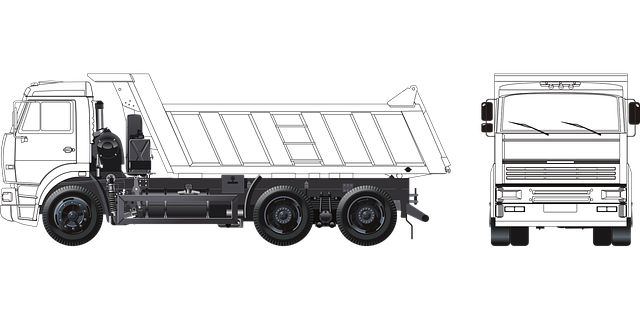Registering a car in California is a straightforward process, but understanding the requirements and gathering the right documents is crucial. This guide will walk you through the steps, ensuring a smooth experience. First, familiarize yourself with California’s car registration mandates, focusing on vehicle identification number (VIN) verification. Collect essential papers, including ownership proof and vehicle history. Next, perform a VIN check at a licensed dealer or DMV to ensure authenticity. Finally, complete the registration online or in-person, making it easy to get your California plates.
- Understand California Car Registration Requirements
- Gather Necessary Documents for VIN Verification
- Perform Vehicle Identification Number (VIN) Check
- Select a Licensed California Car Dealer or DMV Service
- Complete the Registration Process Online or In-Person
Understand California Car Registration Requirements

Before registering your car in California, it’s crucial to understand the state’s specific requirements. One key aspect is ensuring your vehicle has a valid and accurate Vehicle Identification Number (VIN) verification. This process confirms the authenticity of your car’s details, including its make, model, year, and other vital specifications. In California, all vehicles must undergo a VIN inspection to meet registration standards.
The state requires owners to present a current and legitimate VIN inspection report during the registration process. This can be completed through traditional static vehicle inspections or more conveniently with mobile vin verification services. Opting for a mobile vin inspection allows for on-site verification, saving time and effort by eliminating the need to visit an official facility. Ensure your chosen method complies with California’s regulations for accurate and timely car registration.
Gather Necessary Documents for VIN Verification

Before registering your car in California, you’ll need to gather all the essential documents for a successful VIN (Vehicle Identification Number) verification process. This is a crucial step in ensuring that your vehicle complies with state regulations and safety standards. The main document required is your car’s certificate of origin or bill of sale, which proves ownership and provides detailed information about the vehicle. Additionally, you’ll need to have your driver’s license and proof of insurance handy.
For a smoother process, consider utilizing a mobile vin verifier or conducting a mobile vin inspection. These services allow you to verify your car’s VIN at your convenience, potentially saving time and effort. By having all these documents ready, including the vehicle registration from the previous state (if applicable), you’ll be well-prepared for the next steps in registering your car with the California Department of Motor Vehicles (DMV).
Perform Vehicle Identification Number (VIN) Check

Before registering your car in California, performing a Vehicle Identification Number (VIN) check is a crucial step. This verification process ensures that the vehicle’s details match the information provided by the manufacturer. You can conduct this vin inspection yourself using a mobile VIN verifier or visit a designated location for a professional mobile VIN inspection.
A valid and accurate VIN is essential as it helps in identifying specific features, safety standards, and potential recalls associated with your car. By cross-referencing the data with reliable databases, you can ensure that your vehicle meets all the necessary requirements set by California’s Department of Motor Vehicles (DMV). This step simplifies the registration process and guarantees a smoother experience when you bring your car in for its annual inspection.
Select a Licensed California Car Dealer or DMV Service

When registering your car in California, one crucial step is to ensure that your vehicle has passed all necessary inspections. To do this, you’ll either need to visit a Licensed California Car Dealer or utilize a DMV service. These entities are equipped with the tools for a thorough vin verification, which includes checking the vehicle’s history and ensuring it complies with state safety standards.
Opting for a mobile vin verifier can offer convenience, as these services come to you. A vin inspection is typically included in the registration process, so consider this option if you’re looking to streamline things. Alternatively, dealing directly with a dealer or DMV service guarantees that every aspect of your car’s history and condition is accurately assessed, ensuring a smooth and legal registration experience.
Complete the Registration Process Online or In-Person

In California, registering your car can be done either online or in-person at a DMV office. The process is straightforward and involves several key steps, including providing necessary documents and ensuring your vehicle meets all legal requirements. For added convenience, many residents opt for a mobile vin inspection or vin verification service to initiate the registration from the comfort of their homes. This method streamlines the initial stages by allowing you to transmit your vehicle’s unique identification number (VIN) digitally for validation.
When registering online, you’ll need to access the California DMV website and follow the step-by-step instructions. You may be required to present proof of insurance, pay registration fees, and undergo a title transfer if applicable. Alternatively, visiting a local DMV allows for direct interaction with staff who can guide you through the process. Regardless of your chosen method, ensuring accurate vin inspection data is crucial for a smooth registration experience.
Registering a car in California involves understanding specific requirements, gathering essential documents, and completing the process through authorized dealers or the DMV. After performing a crucial VIN verification, you can either register online, offering convenience and speed, or visit a local office for an in-person registration. Ensure all steps are followed accurately to maintain legal compliance and avoid any future issues related to vehicle ownership.



